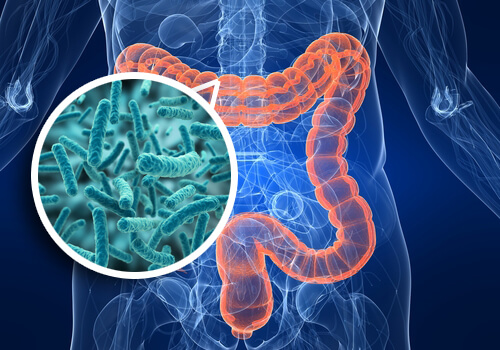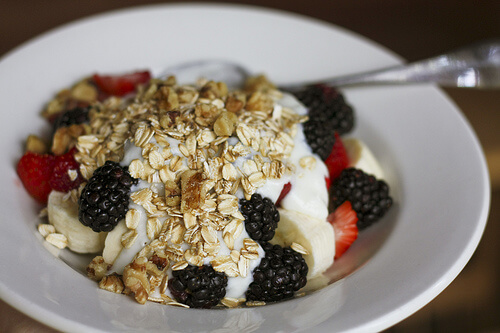Benefits of Drinking Coffee with Breakfast


Written and verified by psychologist Valeria Sabater
Are you one of those people that can’t start your day without a cup of coffee? Well, we’re happy to tell you that it can actually be a healthy habit, especially if you know what foods go well with it. Coffee is the world’s second most consumed beverage after water. And so, in this article, we’re going to explain all that coffee can do for you and all the benefits of drinking coffee with breakfast.
Why should I have coffee with breakfast?
There are a lot of people that leave the house with just a cup of coffee. This, however, is a bad habit that can negatively affect our health.
Leaving the house in the mornings without taking in proper nutrients is no way to start the day! We need to think of breakfast as one of the most important times of the day for our bodies. By skipping breakfast, then we’ll be starving by lunchtime, and this can lead to long term weight gain.
Obviously, it’s best to eat all our meals in their proper proportions. Never, however, underestimate the importance of breakfast. Let’s take a look at some of the benefits of drinking coffee with breakfast.
1. It wakes us up, improving our attention and memory

Coffee is a great stimulant for central nervous system, and so you should be careful how much you drink. Never drink more than two cups per day. When we say cups, we don’t mean large mugs!
2. It’s loaded with antioxidants
Coffee is rich in antioxidants, which strengthen our cells and protect them from free radicals. It protects us from certain types of stress, so drinking it in the mornings is a healthy habit worth taking up. Interestingly, green coffee is richer in antioxidants and even better at burning fat.
3. It protects the good bacteria in the intestines

4. Coffee promotes digestion
Perhaps you didn’t know, but coffee stimulates our gastric juices, improving the breakdown of foods and nutrient absorption. It’s best taken twice daily to improve stomach function and our entire digestive system in general.
5. It protects the liver
Many studies have been conducted on the effects of coffee on liver health and the results are always enlightening. It helps care for the cells of the liver, avoiding illnesses like cirrhosis or fatty liver disease. Keep in mind that we should limit consumption to 2-3 cups per day.
See more: Fight Fatty Liver With These Incredible Natural Remedies
6. Watch what you eat with your coffee

We need to be careful what we eat with coffee. The classic breakfast of a cup of coffee, orange juice, and hot buttered toast just isn’t acceptable, according to experts. When you combine coffee with orange juice, you get a breakfast that’s too acidic.
And what’s more, if the orange juice is the kind sold in supermarkets, it won’t provide the same amount of vitamin C or antioxidants. The best is natural, freshly-squeezed juice.
So what should we have with our coffee? You should start your day with a glass of warm water with lemon. Then, an hour later, eat breakfast as normal. Don’t include butter and toast; they contain fats and refined flours that make breakfast less healthy.
The best idea is to combine coffee with a breakfast of oatmeal with a little soy milk, some nuts and a piece of fruit, like a pear or an apple. Make sure the fruit is fresh. Jams and jellies have too much excess sugar.
If you’d like to have your coffee with a small sandwich, whole grain oat bread would be best with a slice of turkey breast and avocado. You’ll love it and you’ll be leaving your house with all the nutrients you need to last you until lunch.
Remember, drinking coffee with breakfast can be healthy, just don’t abuse it during the rest of the day.
All cited sources were thoroughly reviewed by our team to ensure their quality, reliability, currency, and validity. The bibliography of this article was considered reliable and of academic or scientific accuracy.
- Esquivel, P., & Jiménez, V. M. (2012). Functional properties of coffee and coffee by-products. Food Research International. https://doi.org/10.1016/j.foodres.2011.05.028
- George, S. E., Ramalakshmi, K., & Rao, L. J. M. (2008). A perception on health benefits of coffee. Critical Reviews in Food Science and Nutrition. https://doi.org/10.1080/10408390701522445
- Dórea, J. G., & da Costa, T. H. M. (2005). Is coffee a functional food? British Journal of Nutrition. https://doi.org/10.1079/bjn20051370
- Hindmarch, I., Rigney, U., Stanley, N., Quinlan, P., Rycroft, J., & Lane, J. (2000). A naturalistic investigation of the effects of day-long consumption of tea, coffee and water on alertness, sleep onset and sleep quality. Psychopharmacology, 149(3), 203-216.
- Nehlig, A., Daval, J. L., & Debry, G. (1992). Caffeine and the central nervous system: mechanisms of action, biochemical, metabolic and psychostimulant effects. Brain Research Reviews, 17(2), 139-170.
- Svilaas, A., Sakhi, A. K., Andersen, L. F., Svilaas, T., Strom, E. C., Jacobs Jr, D. R., … & Blomhoff, R. (2004). Intakes of antioxidants in coffee, wine, and vegetables are correlated with plasma carotenoids in humans. The Journal of nutrition, 134(3), 562-567.
- Asano, I., Umemura, M., Fujii, S., HOSHINO, H., & IINO, H. (2004). Effects of mannooligosaccharides from coffee mannan on fecal microflora and defecation in healthy volunteers. Food science and technology research, 10(1), 93-97.
- Klatsky, A. L., Morton, C., Udaltsova, N., & Friedman, G. D. (2006). Coffee, cirrhosis, and transaminase enzymes. Archives of internal medicine, 166(11), 1190-1195.
This text is provided for informational purposes only and does not replace consultation with a professional. If in doubt, consult your specialist.








